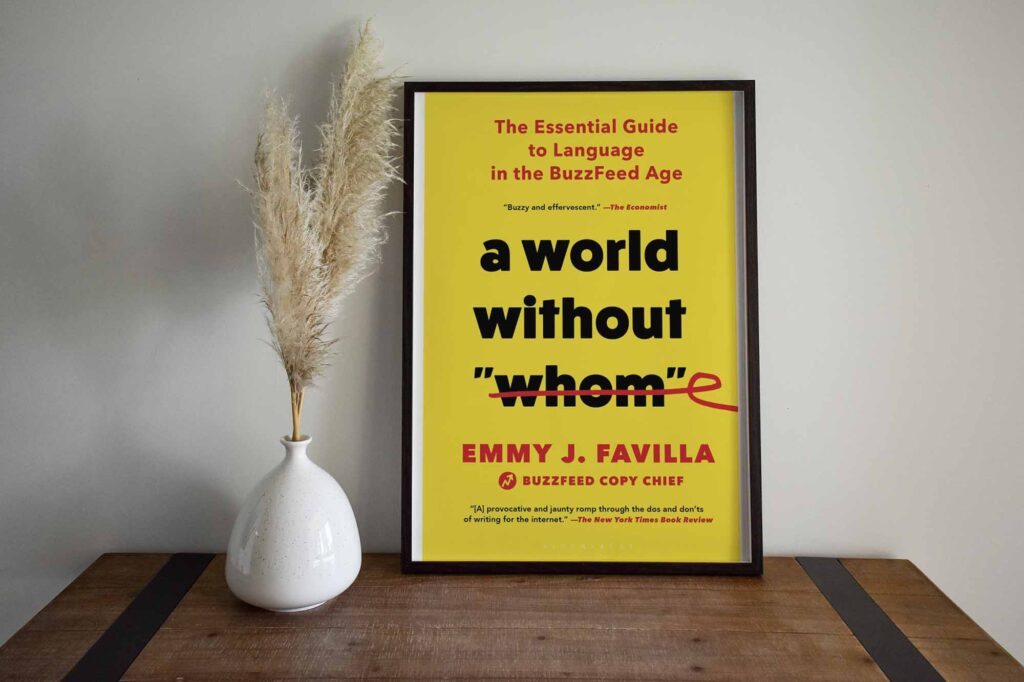John and Hank Green spent a third of a Dear Hank and John episode trying to decide how to spell the colloquial form of casual. Cash would be confused with money. Instead of a 17-minute discussion, they could have just asked BuzzFeed. In growing from clickbait quizzes asking “Which pie are you?” to a massive media platform targeting the most internet savvy, they’ve had to keep a grasp on current language trends. In her new book, A World Without “Whom”, Emmy Favilla discusses how language has changed, how to use it, and why precise controls don’t matter.
Oh, and casual should be shortened to caj.
A World Without “Whom” is the book all marketers and writers need to read. When we get caught up on comma placement and correct English, we need Emmy’s reminder that “A good piece of writing is engaging, interesting, and thorough. Duh, right”. Technical correctness isn’t part of that. Our audiences will relate to engaging, interesting, and thorough; they won’t notice—or care—if you capitalize laundromat or not.
This sounds like it’s a book that says language no longer matters. That’s not right. It does matter, but it’s also fluid. Local colloquialisms now spread and evolve with the internet, faster than ever before. Our audiences are now more geographically and culturally diverse. Language matters more than ever, but the old rules (and style books) are having trouble keeping up. That’s the premise of Emmy’s book. In a discussion of this continual evolution, we learn how to use English as it is today. It’s more about consistency and being understood.
Emmy’s style is entertaining and BuzzFeed-flippant. Oh, and informative. I childishly giggled at some of the examples, like the pipe parentheses butt ( | ). Emmy includes screen grabs of discussions within her team and on Twitter seeking clarifications. I agree we need a better non-gender specific term for fisherman. Speaking of gender-specific terms, there’s an important section on unnecessary mentions of gender and race. If the person’s gender or race isn’t pertinent to the discussion, please DON’T use it. And it’s rarely pertinent to the discussion. I’m thinking I need to start using man doctor — just to see the reaction.
The other section that stood out is the localization. It’s mainly comparing U.S. and U.K. English, with a little Canadian and Australian thrown in. The British swearwords guide is hilarious. Thank you for not using the cute version of bugger. My sister’s baby nickname was buggerlugs, but since discovering its full meaning I can never use it.
I read an eArc, courtesy of NetGalley. It was incomplete (missing some images and with messy formatting). I’d love to see the final copy. There are a couple of not-quite-there chapters that I don’t want to comment on in case they didn’t make the final cut.
Who Should Read A World Without “Whom”?
Everyone publishing on the internet or for non-academic/formal audiences. The final chapter is BuzzFeed’s house style guide, that’s also openly published online. It’s the most current guide available. Remember Chicago’s 2017 update is the first in 16 years. Reading A World Without “Whom” helps you stay relevant in your career and to your audiences.
I’ve removed all links to buy this book. It’s been out for a few years, so be sustainable and visit your local library for a copy. Otherwise, see if your favourite independent bookstore can order it in.
